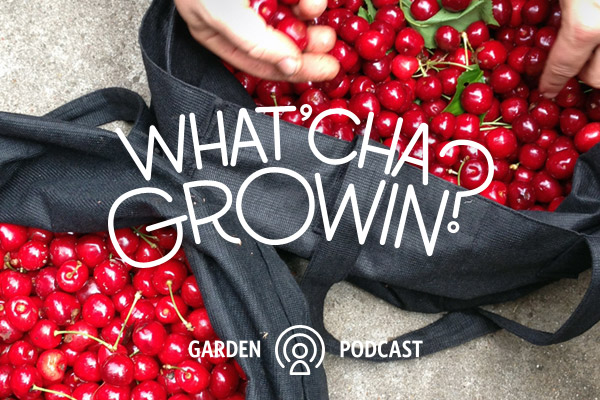
In this episode we go across the street — quite literally — to chat with my neighbour and friend Abbey Huggan. Abbey is a schoolteacher by day and a wild fermenter by night. She’s also an avid gardener and is currently tending three in different locations in the city, including her own tiny yard. She primarily grows edibles and medicinal herbs, but is also a big fan of strange solanums (although we do not discuss it in this chat).
Abbey hardly ever sits still and always has something on the go. In her kitchen there is always (I mean always) a pot of herbal tea brewing and a pot of something or other fermenting.
Abbey is also my foraging partner, and in this episode we chat about our recent exploits picking summer berries, fermenting, dehydrating, making home brew sodas and wine, and we also reveal our foraging methods and favourite tools.
Episode #8: Abbey Huggan | Foraging and Fermenting

How You Can Help Support This Podcast
1. Share and Comment: Getting the word out helps a great deal, so please tell your gardening friends, your horticultural society, or anyone that you think would be interested in it. Share on your blog, Facebook and other forms of social media, retweet on Twitter, or post a photo on Instagram. Knowing that you are listening makes a difference and keeps me motivated. Ratings, reviews, and subscriptions on iTunes helps to get the show find better positioning. You can subscribe here and leave a rating or review here.
2. Use my Amazon affiliate link when you buy something on Amazon. As a writer of books I have my own issues with Amazon; however, a lot of us use it and it does have its perks. When you click on this link before purchasing an item — any item at all — a small percentage of the purchase price goes toward supporting this site, including the podcast. What’s great about it is that it’s something you would have bought regardless so it doesn’t cost you anything extra or guilt you into buying something you don’t need, want, or can’t afford. From my perspective it is much better than running a surplus of ads, sponsored posts, or even worse, running ads that are in opposition to the values around sustainability and affordability that I promote here.
- Subscribe to What’cha Growin? on iTunes.
- Download this episode
- Subscribe to the newsletter for show updates.
- The What’cha Growin? RSS feed
- The permanent page for the What’cha Growin? Podcast on this site.
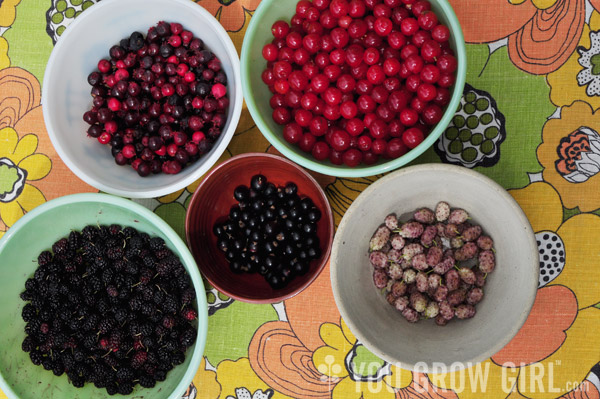
About My Guest
Abbey Huggan is an educator, artist, gardener, gleaner, and fermenter who lives in Toronto.
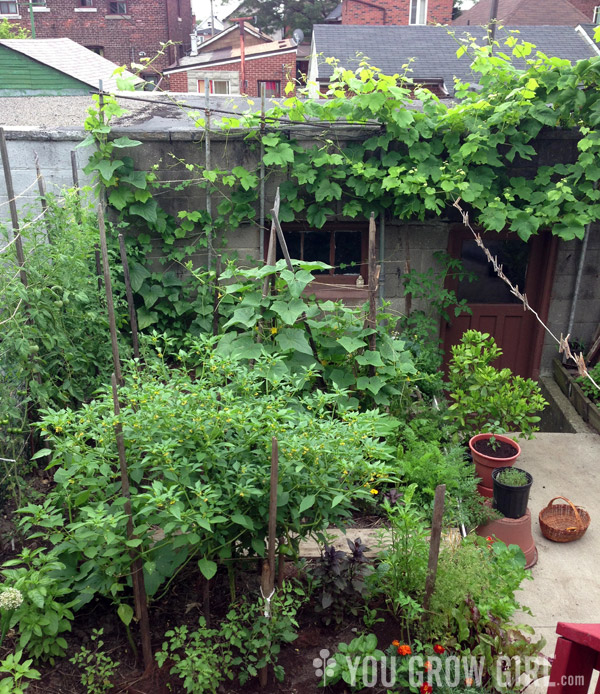
Abbey Huggan grows primarily edibles and medicinal herbs in her tiny backyard garden in Toronto, Canada.
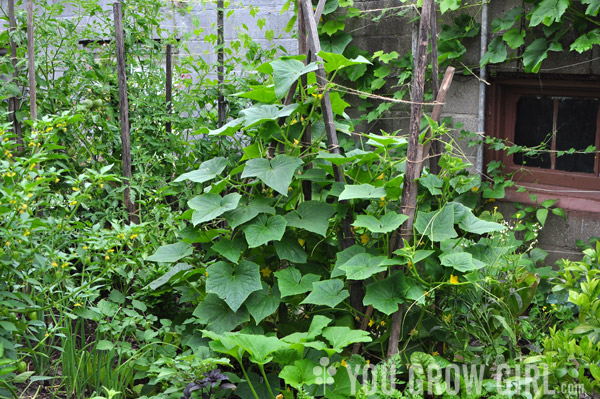
Cucumbers in Abbey’s garden.

Abbey’s tomatillos came up as volunteers from last year’s crop.
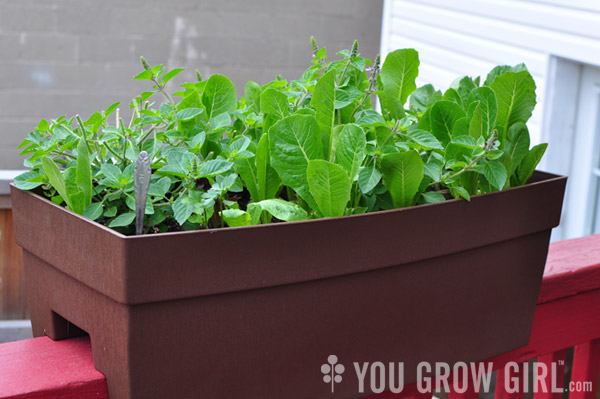
Lettuce and ‘Sacred’ basil growing in a window box. This type of window box that sits over the ledge is great because there is more soil space within the u-shape. Abbey uses’Sacred’ basil in herbal teas.
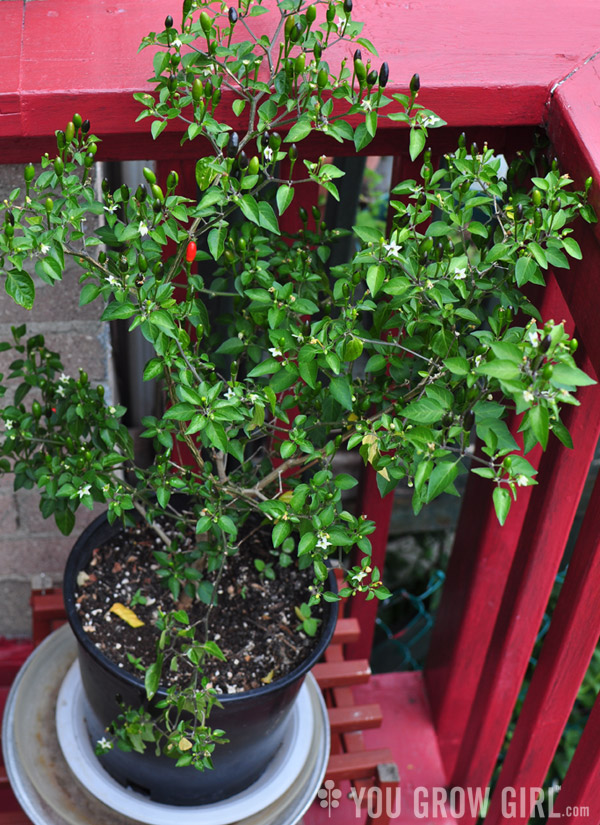
Abbey has been overwintering this hot pepper plant indoors for years. She brings it back outdoors when the threat of frost has passed.
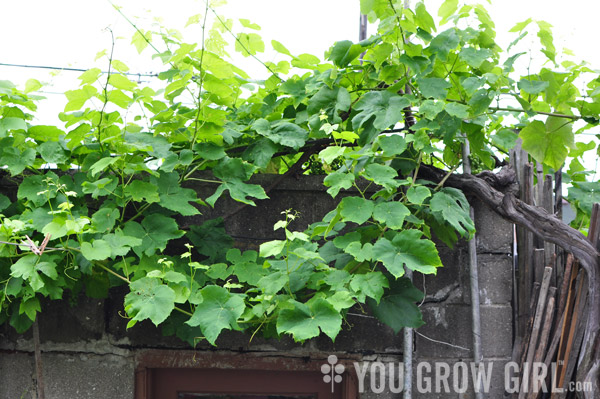
This grape vine was already growing against the garage when she moved in. The former occupants were homemade wine makers.
Further Resources
- Wild Fermentation by Sandor Katz
- The Art of Fermentation by Sandor Katz
- The Fruit Picker that we’ve been using. Attach it to an extendable pole like this.
- The cheap and cheerful Nesco dehydrator that I use.
- Abbey’s Excalibur 9-Tray dehydrator. Pricey, but worth the investment.
- How to make your own kombucha SCOBY.
- The shiso ice tea recipe that Abbey mentions.
That overwintered pepper is so cool!
What do you do with mulberries? They’re all over my yard but they’re so sweet I can’t eat them fresh. I thought jam but I’ve never made it before. Any other suggestions?
My mom was faced with the issue of having lots of mulberries, and found that making mulberry – rhubarb pie was a good way to use the excess of both. (We didn’t have any strawberries.) Tartness of rhubarb offset the bland sweetness of the mulberries.
It’s nice to hear you and your friend are afraid of scary mold sometimes produced during fermenting. I was scared of fermenting mold when fermenting pickles and sounds like it may have been ok. I threw away the one with the mold and kept the others . Thanks for your experience.
Where do you all go to pick cherries in Toronto?
I haven’t seen many on my walks in Scarborough.
Great conversation as always. Love the foraging tips. Heading out to collect fennel pollen soon. You may have hit me with the fermentation “bug” – of the 2 Sandor Katz books which would you suggest for a complete newbie? I am not interested in the alcohols items, but all the rest sound exciting. Thanks!
Oh boy, that’s tricky. They’re very different. “Wild Fermentation” is probably a better beginner book. The Art of Fermentation is more comprehensive and has less direct recipes.